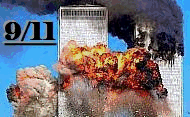 webradio
webradio (deutsch)
(deutsch) michael moore
michael moore  Mondlandungs Lüge
Mondlandungs Lüge (deutsch)
(deutsch)

 Tages-Anzeiger online
Tages-Anzeiger online

|
marcosolo, 29. April 2003 um 18:27:58 MESZ
Premier to declare Thailand Sars-free WHO to guarantee Thai meat exports Yuwadee Tunyasiri Prime Minister Thaksin Shinawatra will announce Thailand as ``a Sars zero-transmission country'' at the Asean Sars summit today. The meeting is likely to work out standard anti-Sars measures for the region. Public Health Minister Sudarat Keyuraphan said in Phetchaburi yesterday that after today's meeting, Mr Thaksin would declare Thailand ``a Sars zero-transmission country''. She said national leaders and the region's top health officials would join the meeting that was expected to put in place a set of common measures to control the spread of severe acute respiratory syndrome. ``We have to prove that we are serious in handling the issue and everything was being done transparently and there was no hidden agenda. Better control mechanisms would not only halt the spread of the disease, but would also create confidence among countries outside the region and help revive trade, investment and tourism,'' Mrs Sudarat said. She noted that information exchanges were essential as the disease had started showing strange development patterns. Doctors have noticed that most of the elderly patients do not develop a high fever but become lethargic and feel drowsy before being gripped by Sars. Young patients on the other hand are hit by diarrhoea before developing Sars, she said. All participants from Singapore, Hong Kong and China to the meeting will be screened for Sars. But the prime ministers and ministers from these countries will be examined in advance and will not have to face virus checks again at Don Muang airport. Others will not be spared. But no one would be required to wear protective masks at the airport or at today's meeting. Mrs Sudarat has also asked the World Health Organisation to guarantee through certification that fresh food exports from Thailand were Sars-free. A wrong impression was created in Singapore after the island state closed its wholesale and retail food markets for sterilisation. The markets are among the destinations where fresh meat from Thailand is available. Some importing countries had panicked to the point that they had started demanding Sars-free certificates for Thai fresh food imports from the Public Health Ministry, she said. The WHO will issue a statement to back the Thai claim on its website, Mrs Sudarat said. ... Link marcosolo, 22. April 2003 um 22:18:54 MESZ Hailing a victory in the drugs war First the good news. With eight days to go, the three-month government campaign against illicit and dangerous drugs has accomplished a lot. It is clear from numerous reports from experienced observers that illegal drugs are no longer freely available on the nation's streets and in factories and housing estates. Massive police attention has shut down many neighbourhood drug rings. The rise in the price of drugs, particularly methamphetamines, shows that the campaign has hit peddlers hard. There is not much more good news. Police credibly believe they have shut down one big ya ba trafficker in Bangkok, but have reneged on their promises to track and arrest his suspected confederates high up in the police force. An expose{AAC} in this newspaper's Perspective section on Sunday showed that a variety of so-called recreational drugs are available in the capital's nightclubs. Despite hundreds of murders and thousands of arrests, the ``drug culture'' appears to have survived. Most troubling of all, close allies of the dictatorship in Burma continue to make, smuggle and sell millions of methamphetamine tablets. If police seizures of the drug have risen _ and we must await official figures for that _ so has the production of speed tablets by the United Wa State Army. The government has made no public approach to Burma to help the drug crackdown which began on Feb 1. Certainly the Rangoon regime, heavily addicted to the money ``invested'' by drug lords, has made no public effort to interrupt the manufacture or smuggling of methamphetamines. Many would agree that it is a little early to declare victory in the drug war and move on to the next problem. Instead of an anti-drug culture, the government campaign has introduced an atmosphere of political fear. Politicians and civil servants alike are rushing to jump on the victory bandwagon being driven by Prime Minister Thaksin Shinawatra. Mr Thaksin has announced the nation will be free of drugs on Dec 2. Interior Minister Wan Muhamad Nor Matha says he will declare 25 of the 76 provinces drug free on Aug 12. The Office of the Narcotics Control Board last week said drug trafficking is no longer a threat to national security. Secretary-General Teeraphat Santimataneedol apparently believes the first 75 days of the crackdown reduced the problem of drugs from the greatest threat to our nation to _ in his words _ a small-scale criminal problem. Surely that statement is debatable, and certainly premature. As far as is known, every major drug trafficker except one remains free, and therefore in business. The police deserve high praise for arresting Suparb Seedaeng, and seizing hundreds of millions in ill-gotten profits. But other international and regional traffickers are still at large. When, not if, vigilance eases against suspected traffickers so police can move to the next wars _ on corruption and piracy, the government says _ the drug dealers will emerge from under the rocks where they have hidden. They will find, because they already know where to look, reliable supplies from the Wa drug kingpins in Burma. And they will find a market. The government has waged a heavy-handed _ some say brutal _ campaign against drug suppliers. It has failed to match it with enlightened and widespread campaigns across the whole country to educate young people against drug abuse and help addicts to kick their habits and resume productive lives. The government has taken heavy and deserved criticism for the violence unleashed by the campaign against drugs. Still, it has made clear progress in tracking and eliminating trafficking networks. What a shame it would be if it simply declares victory and walks away now. The revival of the drug trade is likely to be bigger and more of a threat. ... Link marcosolo, 21. April 2003 um 11:13:29 MESZ From here to eternity Armchair participation in the `war on Iraq' was an eye-opening experience Nick Wilgus I tried rather hard not to watch the ``War in Iraq'', not to watch while helpless Iraqis dodged missiles and bombs launched from the safety of huge battleships out in the Gulf, not to watch pictures of wounded, screaming children, or frightened families huddling in tents far from Baghdad hoping to escape the chaos. Like most people, I was upset by what I saw, such as the pictures of a 12-year-old boy named Ali Ismael Abbas who had lost both his parents _ and both his arms _ when a bomb went astray. Or pictures of frightened American POWs. Despite my best efforts, it was hard not to watch. And in watching, it was hard not to be disturbed by the obvious propaganda being spewed by both sides in the conflict. Iraqi Information Minister Mohammed Saeed al-Sahaf made a name for himself with his outrageous lies about American soldiers committing suicide on the ``gates of Baghdad'' and all the rest of it. The Americans and Britons used terms like And what did we see, actually? We saw carefully edited bits and pieces. We saw what each side wanted us to see. The Iraqis revelled in images of dead bodies and slaughtered civilians, inflaming the Arab world with hatred for the West; the West, for its part, showed off its machines and technology, its superior abilities, its ``shock and awe''. It didn't show the devastation that shock and awe carried out. There have been complaints that the The word ``slaughter'' comes to mind. Most of those soldiers were drafted into Saddam's army, forced to put on the uniform, forced to fight for a regime they probably didn't like and were probably terrified of (and no doubt some surrendered the first chance they had). Aren't the deaths of those many thousands of young Iraqi men worth remembering, worth reporting on? How would the victorious allies feel if pictures of all those many piles of dead bodies were broadcast on CNN? How many widows did this war create? How many children will grow up without a father? How many parents lost a son, or maybe all their sons? After dropping literally thousands of missiles and bombs on the city, by the time the coalition ground forces got to Baghdad, who was left to fight, and what was there left to fight with? The ``coalition of the willing'' must be pleased with themselves, pleased with their superior technology, their control of the air space, their ability to drop bombs on precise targets, all from the comfort and safety of their command-and-control centres. I suspect the rest of the world is not quite so pleased. I suspect the rest of the world might have been left just a little bit frightened by such a display of raw power and destructive capability. Losing about 150 coalition soldiers, they managed to effect a ``regime change'' in a country halfway across the world while leaving thousands of Iraqis dead in their wake _ not to mention all those widows and orphans. Then one must consider all the bodies that Saddam Hussein left in his wake during his decades of rule _ all the torture chambers, the executions, the gassing of the Kurds, the crimes against humanity, attacking his neighbours like Iran and Kuwait. It's hard not to be happy for the Iraqis that they have been liberated from the rule of such a vicious man, but what a terrible price they had to pay. This ``pre-emptive'' business has taken the whole world into new, possibly dangerous waters, a world in which America is the supercop and their interests must be served _ or else. They're already rattling their sabres at Syria. Although this was supposed to strike a blow in the ``war on terrorism'', I suspect it has done nothing but give millions of people even more reason to hate Americans and to resent their arrogant, aggressive ways. Watching war on television is not necessarily a bad thing. Pictures, indeed, are worth thousands of words. And some of those pictures will be hard to forget. An American myself, I'm left with many mixed emotions about this whole business. Pride isn't one of them. ... Link |
online for 8587 Days
last updated: 15.12.12, 03:58  Youre not logged in ... Login

  |
|||||||||||||||||||||||||||||||||||||||||||||||||||||||||||

View My Guestbook
Sign My Guestbook




marcosolo's 
|
marcosolo  webradio statistics webradio statistics |
Nord- Motorrad-trips in Nord Thailand Motorrad-trips in Nord Thailand
|











